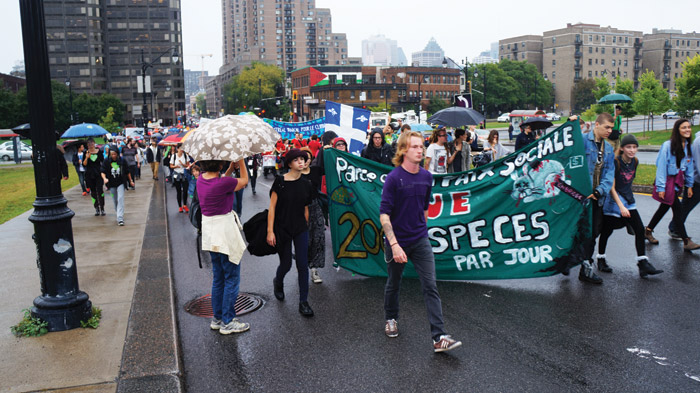Approximately 5,000 people participated in the Montreal branch of the worldwide People’s Climate March demonstration last Sunday afternoon.The global march was organized by a coalition of over 1,500 environmental organizations, intending to make a statement to the world leaders that will convene in New York City on Tuesday, Sept. 23 for a United Nations (UN) climate summit.
Protesters demanded that heads of states take action to halt climate change, including stopping both the Northern Gateway pipeline project from Alberta to British Columbia and the excavation of the Alberta tar sands. They carried signs saying “Assez parler, maintenant agissons,” which translates to “Enough talk, now act.”
“They [should] take an [agreement], so every country has steps to take and actions to do to fight climate change—for example, regulation of carbon emissions, [and more] investment in green energies,” Alex Tari, one of the demonstration’s volunteers, said. “We need to stop exploiting the tar sands, and we need to stop funding these industries [….] We need to develop a real climate action plan and we need to invest in small companies that are developing green energy and alternative ways of transportation.”
The Montreal protest was organized by a group of volunteers after seeing the New York City protest organizers reach out to other cities for a global collaboration.
“It was hard because we didn’t have any funding, we got only three weeks to organize this event, to publicize it,” Tari said. “It’s [a] totally independent organization, we aren’t affiliated with any organization [or] political party.”
Henes Tabourbeau, a participant in the march, echoed the sentiment that the event was a powerful chance to drive climate change action.
“It seems to be a unique opportunity for our voice to be heard, it’s organized all over the world, and we have a chance to be heard by the elite,” Tabourbeau said.
Participants also expressed disappointment in the Canadian federal government’s perceived inaction in climate change initiatives.
“I would like to see Stephen Harper attend the national summit talks,” Ira Sutherland, a masters student at McGill studying forest ecology, said. “I think the fact that he isn’t even attending it shows how much of a laggard he is in the international climate negotiations [….] My main concern with climate change and forests is [that a] warming climate destroys the stability of forests, which makes them more susceptible to [disasters]. If Harper does not take action on greenhouse gas emissions and fighting climate change, I believe that he is partly responsible for the demise of Canada’s forests.”
The New York Climate Summit is a precursor to the United Nations Climate Change Conference that will be held in Paris in 2015, where world leaders hope to achieve a legal and binding agreement on climate on a global scale for all countries.
“[Promoting] climate action aims to show that leaders across sectors and at all levels are taking action, thus expanding the reach of what is possible today, in 2015, and beyond,” the website for the Climate Summit reads. “Combined, accelerated action and increased ambition will foster a ‘race to the top’ that can help advance sustainable development.”








